Development Cooperation Press Tour in Zambia
2025/1/31
On 31st January 2025, the Embassy of Japan hosted a press tour for local media, with participation from six media houses, including newspapers, television stations and radio stations, involving a total of seven journalists and cameramen.
The Embassy designed this tour to showcase Japan’s recent key ODA (Official Development Assistance) projects in Zambia in the fields of health, veterinary medicine and agriculture, which are priority areas for the Zambian government. This initiative was undertaken in light of the last year’s 60th anniversary of diplomatic relations between Japan and Zambia. Through this tour, Japan aims to increase media coverage of its development cooperation efforts while also strengthening outreach to Zambian government officials, intellectuals and the wider public.
The press delegation visited prominent Japanese ODA projects in suburbs of Lusaka, following the itinerary outlined below.
1. Embassy Briefing
Prior to the site visits, Mr. OMINATO Satoshi, Deputy Chief of Mission, provided a briefing at the Embassy of Japan in Zambia. He explained the objectives of the tour and highlighted the long-standing cooperation between Japan and Zambia over the past 60 years. He also emphasised Japan’s commitment to further collaboration across a wide range of sectors, including mining, agriculture, healthcare, education, culture and tourism.

2. Zambia National Public Health Reference Laboratory (ZNPHRL)
The first stop was ZNPHRL, where the delegation observed the ongoing technical cooperation project, "Project for Strengthening Laboratory-based Surveillance for Infectious Diseases" which has been implemented since 2023. This project aims to enhance Zambia’s surveillance capacity through improved laboratory testing, management and stakeholder networking. Given Zambia’s susceptibility to outbreaks of infectious diseases such as cholera, the project supports the establishment of a robust monitoring system for diseases like cholera and rabies in cooperation with ZNPHRL.
During the visit, ZNPHRL Director Dr. Musonda and Chief Project Advisor Dr. Imamura provided explanations about the project. Journalists were informed that Japan’s support has contributed to strengthening Zambia’s laboratory network and quality control systems, helping to meet international standards.
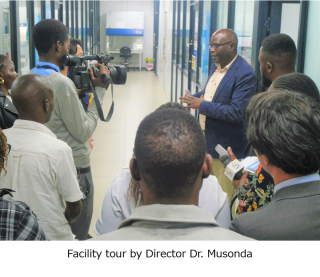
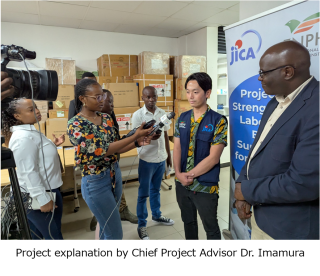
3. University of Zambia (UNZA) School of Veterinary Medicine
Next, the delegation visited UNZA’s School of Veterinary Medicine to observe the outcomes of the 2018 grant aid, "Economic and Social Development Programme," and the 2021 technical cooperation, "Clinical Studies Enhancement Project."
Through grant aid, Japan provided JPY 500 million (approx. 3.7 million USD) and the state-of-the-art medical equipment, including X-ray machines. The technical cooperation project has since focused on ensuring the appropriate use and maintenance of these equipment, improving veterinary training, enhancing clinical education and strengthening hospital management.
During the visit, Acting Dean Dr. Zulu and Project Coordinator Ms. Seki led the tour, explaining how Japan’s support has transformed the school and its affiliated clinic into one of the highest-standard facilities in Zambia, attracting students from across Africa.
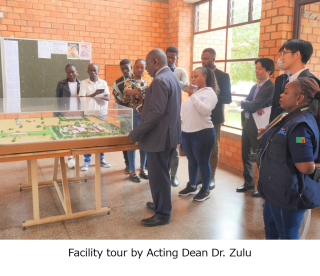

4. Lunch
The tour stopped for lunch at "Musubi," a Japanese restaurant which opened last year in Lusaka. Participants had the opportunity to experience Japanese cuisine, which received highly positive feedback for its quality and taste.
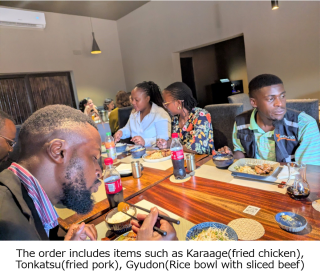
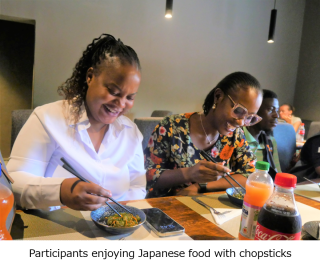
5. Matero Level 1 Hospital
In the afternoon, the tour visited Matero Level 1 Hospital to learn about the "the Project for Upgrading Lusaka Health Centres to District Hospitals (Phase 1&2)" (grant aid, 2013-2021) and the "Project for strengthening Management Capacity of the General Hospitals in Lusaka District " (technical cooperation, since 2021).
Lusaka has faced a shortage of Level 1 hospitals capable of performing basic surgeries and examinations, resulting in an excessive burden on top-tier hospitals, thereby limiting the availability of specialised medical services. To address this issue, Japan’s grant aid project upgraded five key health centres, including Matero, into Level 1 hospital. Meanwhile, the technical cooperation project is working to enhance hospital management, improve infection control measures, strengthen pharmaceutical and equipment maintenance systems, and promote collaboration with relevant institutions.
Medical Superintendent Dr. Liuma and Chief Project Advisor Dr. Murai guided the delegation through the facilities, explaining how Japan’s assistance has contributed to improved hospital infrastructure and increased access to essential medical services.
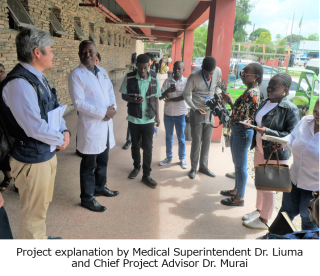
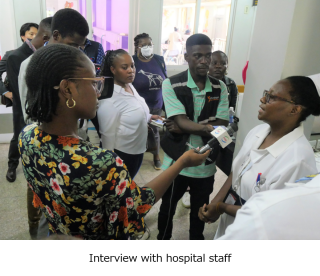
6. Zambia Agricultural Research Institute (ZARI) Mount Makulu Research Station
Finally, the delegation visited the ZARI Mount Makulu Research Station to observe the "Market-Oriented Rice Development Project (MOREDEP)" (technical cooperation, since 2019) and the "Project for the Establishment of An Immediate Rice Variety Development System Using Anther Culture and Citizen Science" under the SATREPS initiative (since 2023).
Zambia has been promoting crop diversification for food security, with rice identified as a priority crop. However, low productivity and insufficient domestic supply have led to continued reliance on imports. The technical cooperation project aims to improve rice production through the development and dissemination of improved cultivation techniques, the establishment of rice clusters, and enhanced market access for farmers. Additionally, the SATREPS project seeks to develop and distribute rice varieties suited to Zambia’s climatic conditions, contributing to increased rice production and farmer incomes.
During the visit, ZARI Acting Director Dr. Kapulu and Deputy Chief Project Advisor Mr. Sato led the delegation through the research facilities, explaining the importance of climate-adaptive rice farming techniques.
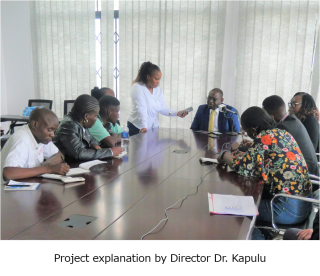
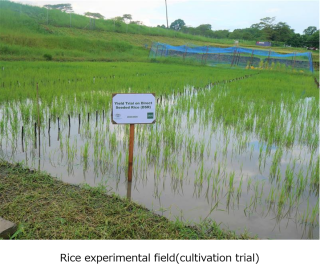
Following the press tour, Zambia National Broadcasting Corporation (ZNBC) aired reports on the event over three consecutive days, and national newspapers featured headlines such as "Japan Supporting Zambia’s Economic Growth." The wide coverage of Japan’s development cooperation initiatives in major newspapers, which reach a broad audience, is expected to enhance the Zambian public’s understanding of Japan’s contributions to the country’s growth.
Related Links (External Sites)
TV programmes and major newspaper articles released after the press tour:
(1) ZNBC
“Japan commits to key projects in Zambia” (1st February 2025)
https://fb.watch/xw9c-ZYXQN/
“Luapula Farmers Set for Rice Training” (2nd February 2025)
https://fb.watch/xw9evXR5vx/
“UNZA Veterinary School gains global recognition” (3rd February 2025)
https://fb.watch/xIbgcw4Kpm/
(2) Times of Zambia
“Over 3,400 farmers to receive training in rice production” (1st February 2025)
(3) Daily Nation
“Japan supporting Zambia’s economic growth” (5th February 2025)
(4) Mwebantu (Web Article)
“Japan and Zambia celebrate 60 years of fruitful relations in various sectors” (1st February 2025)
https://www.mwebantu.com/japan-and-zambia-celebrate-60-years-of-fruitful-relations-in-various-sectors/
The Embassy designed this tour to showcase Japan’s recent key ODA (Official Development Assistance) projects in Zambia in the fields of health, veterinary medicine and agriculture, which are priority areas for the Zambian government. This initiative was undertaken in light of the last year’s 60th anniversary of diplomatic relations between Japan and Zambia. Through this tour, Japan aims to increase media coverage of its development cooperation efforts while also strengthening outreach to Zambian government officials, intellectuals and the wider public.
The press delegation visited prominent Japanese ODA projects in suburbs of Lusaka, following the itinerary outlined below.
1. Embassy Briefing
Prior to the site visits, Mr. OMINATO Satoshi, Deputy Chief of Mission, provided a briefing at the Embassy of Japan in Zambia. He explained the objectives of the tour and highlighted the long-standing cooperation between Japan and Zambia over the past 60 years. He also emphasised Japan’s commitment to further collaboration across a wide range of sectors, including mining, agriculture, healthcare, education, culture and tourism.

2. Zambia National Public Health Reference Laboratory (ZNPHRL)
The first stop was ZNPHRL, where the delegation observed the ongoing technical cooperation project, "Project for Strengthening Laboratory-based Surveillance for Infectious Diseases" which has been implemented since 2023. This project aims to enhance Zambia’s surveillance capacity through improved laboratory testing, management and stakeholder networking. Given Zambia’s susceptibility to outbreaks of infectious diseases such as cholera, the project supports the establishment of a robust monitoring system for diseases like cholera and rabies in cooperation with ZNPHRL.
During the visit, ZNPHRL Director Dr. Musonda and Chief Project Advisor Dr. Imamura provided explanations about the project. Journalists were informed that Japan’s support has contributed to strengthening Zambia’s laboratory network and quality control systems, helping to meet international standards.


3. University of Zambia (UNZA) School of Veterinary Medicine
Next, the delegation visited UNZA’s School of Veterinary Medicine to observe the outcomes of the 2018 grant aid, "Economic and Social Development Programme," and the 2021 technical cooperation, "Clinical Studies Enhancement Project."
Through grant aid, Japan provided JPY 500 million (approx. 3.7 million USD) and the state-of-the-art medical equipment, including X-ray machines. The technical cooperation project has since focused on ensuring the appropriate use and maintenance of these equipment, improving veterinary training, enhancing clinical education and strengthening hospital management.
During the visit, Acting Dean Dr. Zulu and Project Coordinator Ms. Seki led the tour, explaining how Japan’s support has transformed the school and its affiliated clinic into one of the highest-standard facilities in Zambia, attracting students from across Africa.


4. Lunch
The tour stopped for lunch at "Musubi," a Japanese restaurant which opened last year in Lusaka. Participants had the opportunity to experience Japanese cuisine, which received highly positive feedback for its quality and taste.


5. Matero Level 1 Hospital
In the afternoon, the tour visited Matero Level 1 Hospital to learn about the "the Project for Upgrading Lusaka Health Centres to District Hospitals (Phase 1&2)" (grant aid, 2013-2021) and the "Project for strengthening Management Capacity of the General Hospitals in Lusaka District " (technical cooperation, since 2021).
Lusaka has faced a shortage of Level 1 hospitals capable of performing basic surgeries and examinations, resulting in an excessive burden on top-tier hospitals, thereby limiting the availability of specialised medical services. To address this issue, Japan’s grant aid project upgraded five key health centres, including Matero, into Level 1 hospital. Meanwhile, the technical cooperation project is working to enhance hospital management, improve infection control measures, strengthen pharmaceutical and equipment maintenance systems, and promote collaboration with relevant institutions.
Medical Superintendent Dr. Liuma and Chief Project Advisor Dr. Murai guided the delegation through the facilities, explaining how Japan’s assistance has contributed to improved hospital infrastructure and increased access to essential medical services.


6. Zambia Agricultural Research Institute (ZARI) Mount Makulu Research Station
Finally, the delegation visited the ZARI Mount Makulu Research Station to observe the "Market-Oriented Rice Development Project (MOREDEP)" (technical cooperation, since 2019) and the "Project for the Establishment of An Immediate Rice Variety Development System Using Anther Culture and Citizen Science" under the SATREPS initiative (since 2023).
Zambia has been promoting crop diversification for food security, with rice identified as a priority crop. However, low productivity and insufficient domestic supply have led to continued reliance on imports. The technical cooperation project aims to improve rice production through the development and dissemination of improved cultivation techniques, the establishment of rice clusters, and enhanced market access for farmers. Additionally, the SATREPS project seeks to develop and distribute rice varieties suited to Zambia’s climatic conditions, contributing to increased rice production and farmer incomes.
During the visit, ZARI Acting Director Dr. Kapulu and Deputy Chief Project Advisor Mr. Sato led the delegation through the research facilities, explaining the importance of climate-adaptive rice farming techniques.


Following the press tour, Zambia National Broadcasting Corporation (ZNBC) aired reports on the event over three consecutive days, and national newspapers featured headlines such as "Japan Supporting Zambia’s Economic Growth." The wide coverage of Japan’s development cooperation initiatives in major newspapers, which reach a broad audience, is expected to enhance the Zambian public’s understanding of Japan’s contributions to the country’s growth.
Related Links (External Sites)
TV programmes and major newspaper articles released after the press tour:
(1) ZNBC
“Japan commits to key projects in Zambia” (1st February 2025)
https://fb.watch/xw9c-ZYXQN/
“Luapula Farmers Set for Rice Training” (2nd February 2025)
https://fb.watch/xw9evXR5vx/
“UNZA Veterinary School gains global recognition” (3rd February 2025)
https://fb.watch/xIbgcw4Kpm/
(2) Times of Zambia
“Over 3,400 farmers to receive training in rice production” (1st February 2025)
(3) Daily Nation
“Japan supporting Zambia’s economic growth” (5th February 2025)
(4) Mwebantu (Web Article)
“Japan and Zambia celebrate 60 years of fruitful relations in various sectors” (1st February 2025)
https://www.mwebantu.com/japan-and-zambia-celebrate-60-years-of-fruitful-relations-in-various-sectors/
